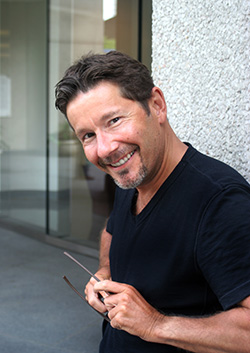Clayton Luz

|
Clayton Luz lives in Chicago, where he is writing his trilogy of crime novels based on real events, presented in a blend of noir fiction and forensic writing, and starring forensic dentist Adam Dunn. His novella, "One Must Think of the Future," was awarded Honorable Mention by Jayne Anne Phillips at the 2001 Santa Fe Writer Project Awards. Luz is a veteran science writer with the American Dental Association. "When the Wind Blows the Water Grey" is his first fiction publication. |
Writing Above Your Head |
 |
|
In 1987 I was an unpublished fiction writer living in Chicago. (It would stay that way for another twenty-four years.) That year I was reading everything I could get my eyes on by Richard Ford—who some years later would win the Pulitzer Prize—beginning with his collected stories, Rock Springs, whose "Sweethearts" knocked the wind out of me, followed by his (rightly or wrongly labeled) Southern gothic debut novel, A Piece of My Heart, then his cinematic work, The Ultimate Good Luck, and then his breakout novel, The Sportswriter, leaving me for three years with the shakes until Wildfire came out in 1990. When Ford's book tour for his celebrated Rock Springs brought him to Chicago that fall, well, that sealed it for me. I had to hear the man. But I went one better: I called the publicity offices at Vintage Contemporaries, his New York publisher, and explained that, as a freelancer for the Tribune Book Section, I wanted to interview Ford. I'd never interviewed anyone in my life (me, who had a journalism degree, Wisconsin '85), least of all a writer's writer. Remember, this was almost twenty-five years ago, long before the corded phone joined manual typewriters on the shelf of quaint technology. I was given the number of Ford's O'Hare airport hotel. Just like that. I don't recall the specifics of our ensuing phone conversation, other than that he agreed, in his Mississippi drawl, to meet for a brief Q&A over a whiskey at his hotel bar. It was a good plan, he said, because afterward I could drive him into the city for the reading. By way of credentialing myself, I'd cited my degree in print journalism and that I'd worked for a time at the Tribune's sister publication, the Orlando Sentinel. I'd worked at the daily all right, though not as a journalist but as a headset-wearing PBX operator who made penny commissions placing classified ads. It was a telephonic drudgery. I hated it, quit after three months and fled back to my hometown of Chicago. This was two weeks before Ford's visit. Anyway, there's more to this adventure, which includes at its peak an exasperated Ford banging on the car horn of my un-air-conditioned Chevy Chevette, which omitted a Felix Unger-like nasal bleat in the rush-hour mayhem. Coming into the city, I'd gotten disoriented with my East-West bearing and now we were lost. The weather was unseasonably warm, the tall Ford was sweating over his folded knees and knocking on the horn, and we were running late for the reading. Despite my galloping heart and fumbling manner, I managed to get us to the bookseller in Lincoln Park two minutes ahead of time. Ford was his courtly self again as he seated himself before the folding-chair crowd at the rear of the bookstore. He sincerely thanked me for my time and bringing him to the reading. I don't recall what I said or how I acted. I do know I was so mortified that I didn't stay for his appearance. I have read many times that Ford is a kind and gentle man. What at first I took to be the typical Southerner's deportment, now when I look back on it, seems perhaps less grounded on southern manners than on a soulful disposition. Let me explain: While we talked Ford spoke earnestly—not pontificating or advising, but sharing—and at one point he said: "Write above your head." I don't recall when Ford said this during our time together, but I do remember him saying it reverentially. It is a reverential thing to say, maybe that's what colors the memory. In any event, I've never forgotten it. So, what did he mean by "write above your head"? I knew there was something weighty to it, but I couldn't fathom it. Then twenty-four years later, when asked by Glimmer Train's editors to submit an essay for the bulletin, I thought, What the hell do I know? And Ford's "Write above your head" came clanging out of the blue at me, yet again. Sometimes we have to let things we experience age a while in our souls before they ripen into a knowing. I'm with Henry James, who wrote "Experience is never limited, and it is never complete; it is an immense sensibility, a kind of huge spider-web of the finest silken threads suspended in the chamber of consciousness, and catching every air-borne particle in its tissue." In other words, I had to live a sum of life before Ford's meaning reached my consciousness. I understand now. My short story "When the Wind Blows the Water Grey" represents my first published fiction. And it got that way because I finally wrote above my head, I believe. What does that mean? Ginsberg's "first thought-best thought" answers with this: write honestly, challenge yourself, write what you know, and it is all that. Writing above your head makes something happen inside; it's a process of self-realization, a self-knowing that Steven Pressfield artfully described as giving "birth to ourselves, to that person we were born to be, to the one whose destiny was encoded in our soul, our diamon, our genius." Yeah, I know, it sounds all flouncy and mystical and cottony, but a person knows what he knows, and this is what I know: If I write above my head, the work I create is a piece of my heart. | |
